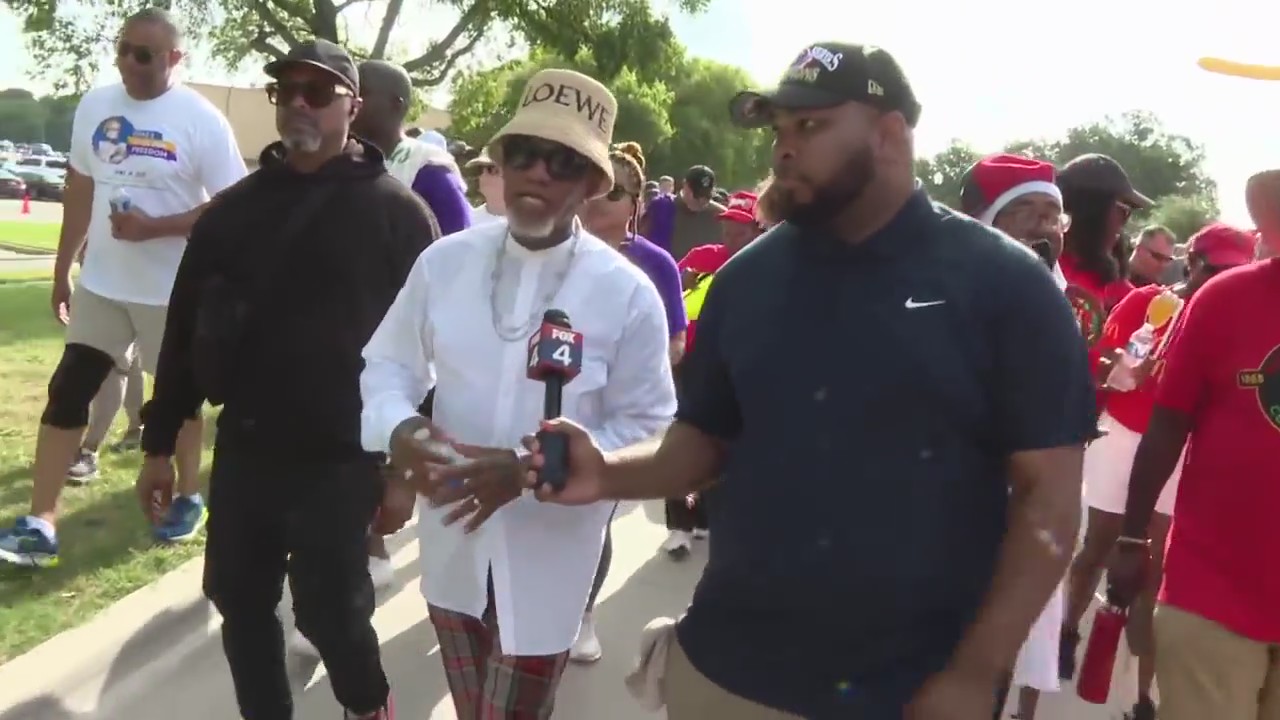Opal's Walk for Freedom: Annual Juneteenth walk in Fort Worth

FULL: Opal's Walk for Freedom 2025
FOX 4's Steven Dial talks with people participating in Opal's Walk for Freedom celebrating Juneteenth in Fort Worth.
FORT WORTH, Texas - Hundreds of people carried on the dream of Opal Lee in her Walk for Freedom in Fort Worth.
Every year, the walk is led by the 98-year-old, known as the Grandmother of Juneteenth.
Now a national holiday, Juneteenth commemorates the abolition of slavery in the United States.
This year, Lee did not participate in the two-and-a-half mile walk due to recent health issues.
The crowd was made up of families, lawmakers and community leaders.

Juneteenth 2025: Comedian D.L. Hughley on importance
Comedian D.L. Hughley made the trip to Fort Worth to walk in Opal's March for Freedom in Fort Worth.
While Lee was not at the walk in person, her legacy and impact was still felt.
What they're saying:
"So much of our history is under attack right now. They're trying to diminish what've done and been through, it just speaks to how resilient we are," said comedian and activist D.L. Hughley.
"To me, Juneteenth and us celebrating this day nationally is a long time coming. Really just to educate people about Juneteenth, what it means, is really what it's all about," said Congressman Marc Veasey.

Juneteenth 2025: Congressman Marc Veasey
FOX 4's Steven Dial talked with Congressman Marc Veasey during Opal's Walk for Freedom. Veasey says it is important to continue to educate people about Juneteenth.
"Its not just Black history, its Texas history, its American History," said Danete Kervin.
The Legacy of Dr. Opal Lee

Opal Lee, Grandmother of Juneteenth (2023)
In 2023, FOX 4 sat down with Opal Lee, a Fort Worth woman who became known as the Grandmother of Juneteenth. Hear her story about the effort to make Juneteenth a national holiday.
Dr. Opal Lee launched her walking campaign for Juneteenth awareness at the age of 89, initiating an online petition that garnered 1.6 million signatures. Her efforts culminated on June 17, 2021, when she was present at the White House as President Joe Biden signed the Juneteenth National Independence Day Act, establishing June 19 as a federal holiday.
Despite the national recognition, Lee remains resolute in her mission. She views the Juneteenth national holiday as a time for reflection, urging people to ask, "Are we free yet?" As she often says, "None of us are free if we're not all free." Her continued walks across the country serve as a powerful reminder to assess the progress made toward true universal freedom. She modestly describes herself as "just a little old lady in tennis shoes getting in everybody’s business."
What is Juneteenth?
Juneteenth marks the day in 1865 enslaved people in Galveston, Texas found out they had been freed.
Although President Abraham Lincoln’s Emancipation Proclamation freed the slaves in 1863, it could not be enforced in many places in the South until the Civil War ended in 1865. Even then, some white people who had profited from their unpaid labor were reluctant to share the news.
Laura Smalley, freed from a plantation near Bellville, Texas, remembered in a 1941 interview that the man she referred to as "old master" came home from fighting in the Civil War and didn’t tell the people he enslaved what had happened.
"Old master didn’t tell, you know, they was free," Smalley said. "I think now they say they worked them, six months after that. Six months. And turn them loose on the 19th of June. That’s why, you know, we celebrate that day."
News that the war had ended and they were free finally reached Galveston when Union Maj. Gen. Gordon Granger and his troops arrived in the Gulf Coast city on June 19, 1865, more than two months after Confederate Gen. Robert E. Lee surrendered to Union Gen. Ulysses S. Grant in Virginia.
Granger delivered General Order No. 3, which said: "The people of Texas are informed that, in accordance with a proclamation from the Executive of the United States, all slaves are free. This involves an absolute equality of personal rights and rights of property between former masters and slaves, and the connection heretofore existing between them becomes that between employer and hired labor."
Slavery was permanently abolished six months later, when Georgia ratified the 13th Amendment. And the next year, the now-free people of Galveston started celebrating Juneteenth, an observance that has continued and spread around the world. Events include concerts, parades and readings of the Emancipation Proclamation.
What does Juneteenth mean?
It’s a blend of the words June and nineteenth. The holiday has also been called Juneteenth Independence Day, Freedom Day, second Independence Day and Emancipation Day.
It began with church picnics and speeches, and spread as Black Texans moved elsewhere.
The Source: Information in this article is from Opal's Walk for Freedom website, and previous FOX 4 News coverage.

